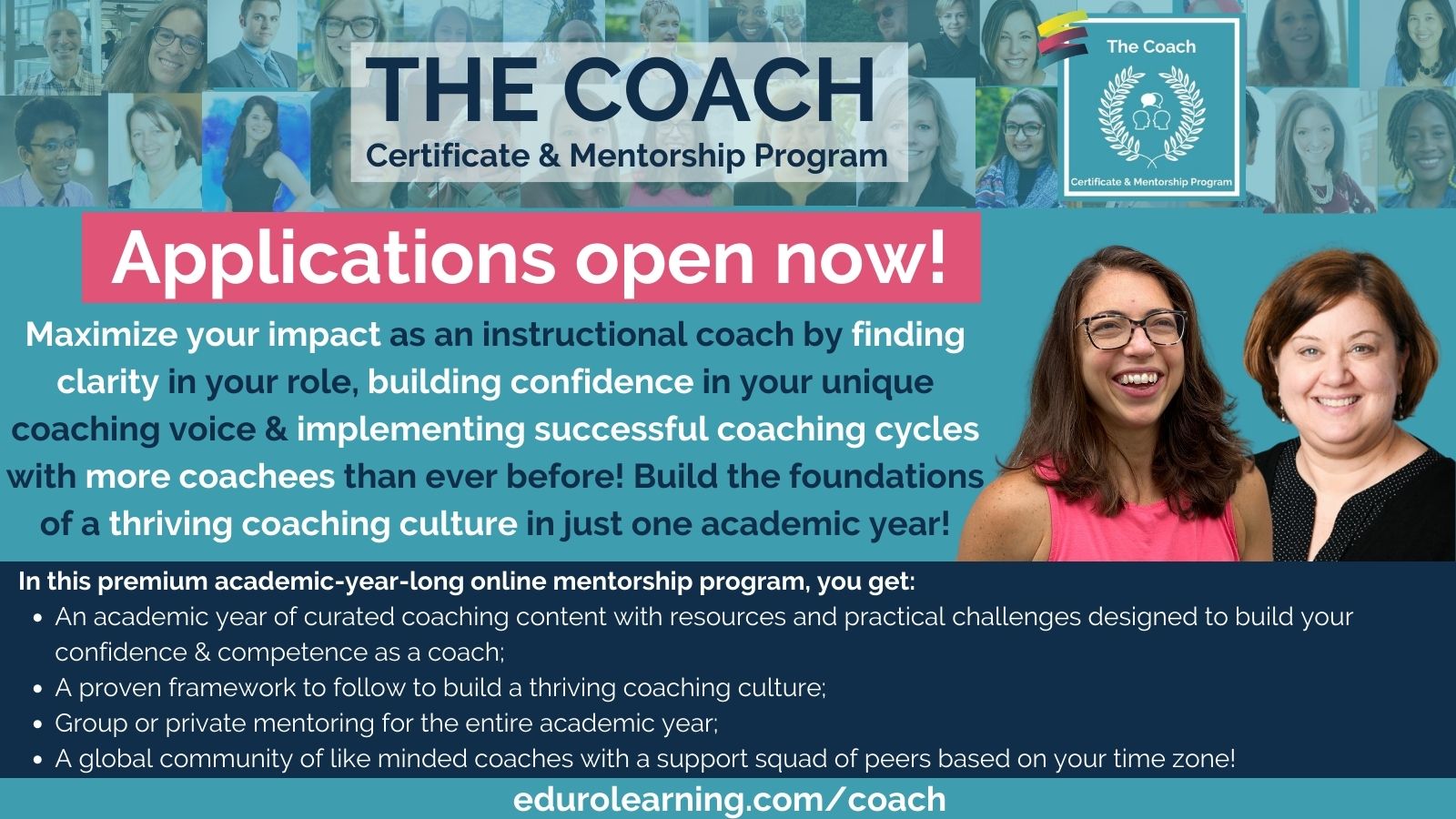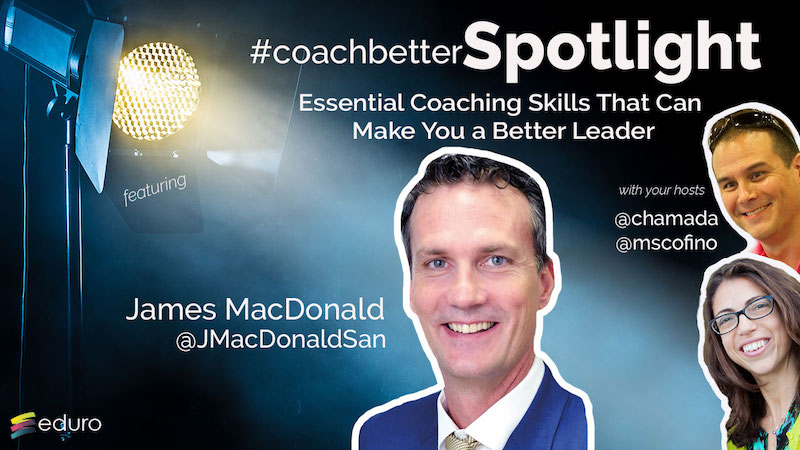In this #coachbetter episode, Clint and Kim are chatting with James Macdonald, Senior Vice President of Education at GEMS Education. Clint and Kim worked with James when he was Head of School at Yokohama International School in Japan, and Kim was fortunate to work with him again when he was Head of School at NIST here in Bangkok. This conversation explores the different elements of coaching that are essential to be an effective leader – and how your coaching expertise can help make you a better leader. James’s extensive experience with a wide variety of school cultures and curriculums allowed us to have a far reaching conversation about when and where coaching fits best. For school leaders or coaches interested in understanding how and when to invest in coaching as an educational intervention, this episode is for you!
Subscribe to #coachbetter via your favorite Podcast Player!
Featured Guest

Bonus! Watch the Spotlight Version on YouTube!
Show Notes
Started as IT Director at YIS. Singapore Canadian School. At YIS for 8 more years as Head of School. NIST as Head of School. Now at GEMS in Dubai.
GEMS has English national schools, Indian, US and IB schools. Oversee US and IB curriculum schools. 11 different schools.
What is your perspective on coaching?
Now it’s a job title. It could be thought of as a skill set. Even though some people will have the formal job title, coaching is a vital skill set, particularly for leadership.
We need the type of leaders who aren’t just focusing on the management side, we need leaders who can inspire and tell them about the why. You can’t get people to move in the same direction is by compliance, it’s through relationships and conversations. If you’re a highly skilled coach, chances are, you’ll be highly effective in galvanizing people into a specific direction, keeping the community together. Great leaders show great coaching skills.
Years ago, leaders in schools came from PE because of their experience with scheduling and systems. With a background in IT, James felt that was great preparation because of the need of dealing with people in highly emotional states.
Now he’s noticing that the most effective leaders in the network are trained coaches. They have a way of phrasing things and guiding conversations in a way to get everyone on board.
Do you have the opportunity to coach your school leaders in being coaches?
PD organization attached to GEMS, which has options for coaching. One of the ways that’s most effective to learn is on the job. Benefits of a large organization like GEMS, is that we have peers, so we can learn alongside other Heads of Schools.
What are the essential coaching skills of an effective leader?
High degree of emotional intelligence. The ability to acknowledge some of the emotions in the room and start there. When they’re in the middle of a difficult situation, that might be intense, by just pausing and taking a moment to acknowledge what the other person is feeling and asking for clarification can remove so much of the tension in the room.
Constructivism. A coach is good at providing an architecture for people to think about things in a new way – within their zone of proximal development.
Take a situation, and modify your approach based on the other person’s perspective.
Combining all of this with being able to build relationships are the skills we need to be effective leaders.
Cognitive Conflict is valuable, what we don’t want is Emotional Conflict. All good teams have psychological safety, and coaching can help create that safe environment.
Coaching as a leadership skill set – most effective leaders in schools are trained coaches.
How does coaching work in different types of schools?
Educational Interventions: Schools are in different places – coaching and the approach to leadership intervention will change depending on the school. More controlling and central oversight when a school is weak. When it’s higher performing, can put power in the hands of the senior leadership of the school. Likely to find coaching in a higher performing school.
In an IB curriculum, schools are more open and flexible, and teachers have more flexibility, coaching becomes more important. In a more rigid curriculum, it might be more difficult to implement coaching. This is about implementing agreed curriculum standards, so teachers don’t have as much opportunity to be reflective practitioners. The nature of the curriculum can influence the success of coaching.
What it takes to go from a weak to a good school system is really different than what it takes to go from good to outstanding. If you’re struggling in a weak school system (where literacy rates are low, and teachers standards are low), interventions need to be different (standardized tests to track and measure improvement). Once you have a high performing school, you need to pull away from central control and inspections, you need to empower individuals and trust teachers.
Coaches are less relevant in the weak end of the scale and become highly relevant at the top end of the spectrum. Coaching works with a school context with a high level of teaching practice. Coaching becomes a professional reflection on how we can get even better. Bespoke PD for each individual. Coaches have a role in certain types of schools, that are already high performing and wanting to go to the next level.
Buffet of Educational Interventions, but you only have one plate. At what stage do you put in coaching?
How do we find the tipping point for when a school is ready for coaching?
Schools could use a self-assessment document to determine their readiness for coaching.
Everyone has different starting points. When it comes to PD, we often have blanket approaches. Some people need coaches, some people need something else. The more we can individualize PD, the more we can move forward as a school.
It’s when you decide that everyone has to do the same thing that it doesn’t work.
What’s the starting point with the teacher? How do you find where they’re at? What does the teacher have for feedback loops to decide what they need to improve upon? Getting that system right can build a personalized learning environment.
How do you manage the tension between growth and exploration and the necessity of accountability?
There’s a vulnerability to professional growth. When jobs are on the line, it would be irrational to reveal professional weaknesses. If you have high performing teachers, you can put a wall between evaluation and coaching. Professional support plans are separate from professional growth. Keep accountability systems separate from PD, but make sure it’s transparent.
Fundamentally it’s trust. If there are any blurred lines between PD and accountability you aren’t going to have full window into professional growth opportunity.
What are the essential elements for coaching success in a school?
Can have coaching in any school. Coaching allows individuals to internalize change. In any educational setting, coaching skills are vital. There can be a gap between leaders that do have coaching skills and those that don’t. The way in which skilled coaches can lead a conversation, manage emotions, develop shared understandings is what a leader should do. When that’s not present in any setting, it creates a culture that you don’t want.
What’s the difference between Instructional Coaching and the more Cognitive Coaching model you’ve described today?
Coaching is an intervention, an investment. Schools that determine that instructional coaching is the way forward, believe that having coaching on a certain instructional practice will propel forward the goals, regardless of any other structures in place. Cognitive coaching is more informal and interpersonal. Instructional Coaching has more potential for evaluation, than Cognitive Coaching.
We operate in schools along theories of change. We think that if we do this, there is a relationship to something else. We think by having instructional coaches, we’ll have better outcomes for children. Another theory is sending teachers out for PD, we’ll have better learning.
How can we have the best of both worlds even with a limited budget? Cognitive Coaches and Instructional Coaches?
What we’re talking about is creating culture. If you make it really clear that you value peer coaching, you’re saying that you value professional learning. What you need is shared vocabulary and skills, it doesn’t have to be labeled or branded. Watch different types of training emerge from that.
Value to having conversations with the community about priorities, and making the decision together. Don’t need to have everything, just need to justify what you choose. If you can articulate where you’re trying to get to, then you can choose what approach would work well.
Level Up Your Coaching with The Coach!
If you are ready to dive deep into your coaching practice, to help you #coachbetter and build a thriving coaching culture in your school, please join us for our next cohort of The Coach!
Wherever you are in building a coaching culture in your school, The Coach will give you the strategies, skills and tools you need to make coaching a success and will empower you to confidently apply instructional coaching strategies in any situation – from building a coaching program, to having coaching conversations, to being a leader in your school community. We facilitate only one cohort each academic year so we can offer individualized support for each participant.
Coaches of all levels are welcome: you’ll start the program with a self-assessment to determine exactly what the next steps are for you!
Registration for our next global cohort opens once a year – check the website for details!






Recent Comments